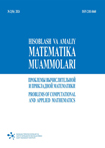METHODOLOGY FOR ASSESSING THE EXISTING LEVEL OF INFORMATION SECURITY OF THE EDUCATIONAL INFORMATION SYSTEM
Keywords:
educational information system, modeling, fuzzy logic, cognitive modeling, fuzzy number, evaluation of the qualities of information systemsAbstract
This article is devoted to the problem of assessing the level of information security of educational information systems in the context of digital transformation of society. It proposes a methodology based on expert information and a knowledge base consisting of fuzzy production rules to determine the level of information security of educational in formation systems. This approach is characterized by the ability to formalize qualitative assessments of the state of the system using the theory of fuzzy sets and assess the level of information security not only in real time, but also at the stage of their creation, develop ment and implementation. In addition, the presented technique involves the construction of a hierarchy of damage to the system, which can complicate the process of their iden tification. The application of the proposed methodology is illustrated by the example of calculating the existing level of information security and the level of destructive impact of damage to structural components of educational information systems and information security tools on the educational process within the framework of the system under study. The developed methodology and algorithms, compared with existing analogues, take into account the impact of damage to information resources and information security tools on each other within hierarchical levels, as well as qualitative expert assessments of damage conditions. The implementation of this methodology makes it possible to increase the effectiveness of the quality management process of educational information systems and the educational process as a whole.
References
Rustamov N. Prikladnoye raspoznavaniye.– Turkestan, 1999.– 84 s.
Chichkin A.V. Matematicheskaya informatika.– M.: Nauka, 2003.– 416 s.
Tuzovskiy A.F., Yampol'skiy V.Z. Sistemy upravleniya znaniyami v obrazovanii // Sovremennyye sredstva i sistemy avtomatizatsii.– Tomsk: Izd-vo Tom. un-ta, 2002. C. 295-299.
Gorskogo D.P., Tavanskoy P.V. Logika.– M.: GIPL, 1956.– 280 s.
Rustamov N.T., Israilov R.I., Rustamov B.K. K voprosu proyektirovaniye bazy znaniy (na primere mozgovogo insul'ta).– Tashkent: Izd-vo innovatsionnogo razvitiya, 2020.– 112 s.
Dosanov N.Ye., Rustamov Ye.N. Fraktal'nost' produktsionnykh znaniy // Rol' innovatsionnykh tekhnologiy v novom mire : trudy III mezhdunar. nauch.-prakt. konf.: T. 1. Almaty, 2019.– C. 41-49.
Rustamov N.N., Khudiyarov G.B., Rustamov Ye.N. Otbor pretenduyushchikh na sport vysshikh dostizheniy.– T.: Fan, 2016.– 136 s.
Rustamov N.T. i dr. Upravleniye slozhnymi ob"yektami metodami raspoznavaniya. Tashkent, 1990.– 20 s.
Verkhoshanskiy YU.V.. Osnovy spetsial'noy silovoy podgotovki v sporte.– M.: Fiz kul'tura i sport, 1977.– 215 s.
Korobkov A.V., Chernyayev A.V., Tret'yakov N.D. Metodika otsenki fizicheskoy podgotovlennosti sportsmena.– M.: Fizkul'tura i sport, 1963.– 52 s.





